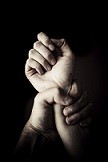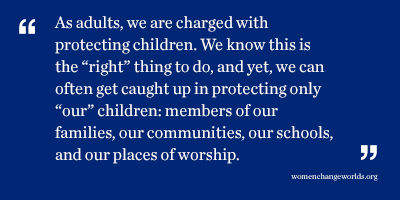 The United Nations General Assembly proclaimed June 4th as International Day of Innocent Children Victims of Aggression(resolution ES-7/8)in 1982 to recognize the “physical, mental, and emotional abuse” many of the world’s children endure. Unfortunately, we even need to have a day to acknowledge such horrific tragedies. According to the Children’s Defense Fund every day in America:
The United Nations General Assembly proclaimed June 4th as International Day of Innocent Children Victims of Aggression(resolution ES-7/8)in 1982 to recognize the “physical, mental, and emotional abuse” many of the world’s children endure. Unfortunately, we even need to have a day to acknowledge such horrific tragedies. According to the Children’s Defense Fund every day in America:
- Every 30 seconds during the school year a public school student is corporally punished;
- Every 47 seconds a child is confirmed as abused or neglected;
- Every seven hours a child is killed by abuse or neglect.
Yet, even reading these statistics, we may have become desensitized or rationalize that these realities only exist for particular communities. Stereotypes place such brutality specifically in “urban neighborhoods” (often read: Latino and/or Black communities) or low-income areas. However, additional CDF statistics confirm:
 - Every 58 seconds during the school year a Latino public school student is corporally punished, every 57 seconds for Black students, and 48 seconds for White students;
- Every 58 seconds during the school year a Latino public school student is corporally punished, every 57 seconds for Black students, and 48 seconds for White students;
- Every day, 402 Latino, 360 Black, and 797 White children are confirmed as abused or neglected;
- Every day, one Latino, one Black, and one White child is killed by abuse or neglect.
The long-term social and health effects of childhood abuse and neglect are poignantly illustrated by the Adverse Childhood Experiences Study (ACE Study). The study, sponsored by the Centers for Disease Control and a California HMO, found that one in four f the 17,000+ middle-income subjects had endured at least one of the “adverse” categories (i.e. abuse, neglect, divorce, household substance abuse or mental illness). Furthermore, one in eight people had experienced four or moretypes, which led to graded risks for health conditions such as depression, substance abuse, heart and liver disease.
Luckily, thanks in large part to such empirical evidence as the ACE Study, as a culture we are beginning to understand and to accept that childhood trauma deeply affects our daily lives. We are also increasingly acknowledging how trauma deeply affects adults which, with proper treatment and support, can act as violence prevention in our families and communities.
For instance, a soldier returning home with Post-Traumatic Stress Disorder (PTSD) and his family can now receive support, whereas this wasn’t always the case. Actor Patrick Stewart recently eloquently spoke out at comic book convention about surviving domestic violence as a child of a WWII veteran father who suffered from what was then referred to as “shellshock.” Blogger Heather Skye had acknowledged Stewart during a convention panel for his recent speech at Amnesty International against domestic violence, while also identifying herself as a domestic violence survivor. Stewart’s emotional reply implored that violence is “never” the answer, and that “men can stop domestic violence.”
As adults, we are charged with protecting children. We know this is the “right” thing to do, and yet, we can often get caught up in protecting only “our” children: members of our families, our communities, our schools, and our places of worship. But for children who were born to parents who cannot keep them safe--children who have (to paraphrase Warren Buffett) lost the biological lottery--we must also take responsibility for keeping them safe. All too often, violence remains a “private family matter.”
On this International Day of Innocent Children Victims of Aggression, I am making the plea that the United States take a big step forward in keeping all children safe by endorsing the United Nations Convention on the Rights of the Child, which only the United States, Somalia, and South Sudan have not ratified. Yes, such documents are often viewed as “only a piece of paper.” However, I believe there is power in taking a public stand as a country, especially when one signature proclaims that the United States supports protecting and ensuring children's rights and they have agreed to hold themselves accountable for this commitment before the international community.” All children deserve such a vow.
Kate Price, M.A., project associate at the Jean Baker Miller Training Institute (JBMTI) at the Wellesley Centers for Women (WCW), is also a social scientist in the cultural construction of childhood. As a survivor of childhood sexual exploitation, Price authored a chapter in the textbook, Global Perspectives on Prostitution and Sex Trafficking: Europe, Latin America, North America, and Global (Lexington Books), examining child prostitution through a Relational-Cultural Theory lens. An audio recording of her March 2012 WCW seminar, “Longing to Belong: Relational Risks and Resilience in U.S. Prostituted Children,” is available online, and a copy of her recent working paper by the same title is available through WCW Publications.
When you subscribe to the blog, we will send you an e-mail when there are new updates on the site so you wouldn't miss them.
Comments